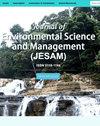基于可持续生计的气候变化适应能力评估:以菲律宾Benguet La Trinidad的有机和传统蔬菜种植者为例
IF 0.3
4区 环境科学与生态学
Q4 ENVIRONMENTAL SCIENCES
引用次数: 6
摘要
由于农业生计的高度脆弱性,适应气候变化对发展中国家的农民至关重要。科学文献提出有机农业是一种很有前景的适应策略,但缺乏微观层面的研究。本研究比较了菲律宾Benguet La Trinidad地区有机蔬菜种植者和传统蔬菜种植者对气候风险的适应能力。在可持续生计框架的指导下,利用五个生计资本下的30个变量计算家庭适应能力指数。有机农户比传统农户具有更高的适应能力,具有更高的自然资本、金融资本、人力资本和社会资本。有机农民较高的适应能力是由于与有机农业相关的农业实践,如作物多样化、可持续土地管理和参与组织。这表明有机耕作有提高蔬菜农户适应能力的潜力。研究结果支持了有关有机农业对农业系统恢复力的贡献的文献。建议在具有类似背景的地区增加对有机农业的支持,以适应气候变化的管理。本文章由计算机程序翻译,如有差异,请以英文原文为准。
Sustainable Livelihoods-Based Assessment of Adaptive Capacity to Climate Change: The Case of Organic and Conventional Vegetable Farmers in La Trinidad, Benguet, Philippines
Climate change adaptation is vital for farmers in developing countries due to the high vulnerability of agricultural livelihoods. Scientific literature proposed that organic farming is a promising adaptation strategy, but micro-level studies are lacking. This study compared the adaptive capacity to climate risks of organic and conventional vegetable farmers in La Trinidad, Benguet in the Philippines. Guided by the Sustainable Livelihoods framework, thirty variables under the five livelihood capitals were used to compute Household Adaptive Capacity Index (HACI). Organic farming households have higher adaptive capacity than the conventional group, and have higher natural, financial, human, and social capital. The higher adaptive capacity of organic farmers was due to farm practices related to organic agriculture such as crop diversification, sustainable land management, and participation in organizations. This indicated that organic farming potentially enhances adaptive capacity of vegetable farming households. Findings support literature on the contribution of organic farming to the resilience of agricultural systems. Increased support toward higher adoption of organic farming in areas with similar context is recommended for adaptive management to climate change.
求助全文
通过发布文献求助,成功后即可免费获取论文全文。
去求助
来源期刊

Journal of Environmental Science and Management
ENVIRONMENTAL SCIENCES-
CiteScore
0.90
自引率
0.00%
发文量
10
审稿时长
2 months
期刊介绍:
The Journal of Environmental Science and Management (JESAM) is an international scientific journal produced semi-annually by the University of the Philippines Los Baños (UPLB).
JESAM gives particular premium to manuscript submissions that employ integrated methods resulting to analyses that provide new insights in environmental science, particularly in the areas of:
environmental planning and management;
protected areas development, planning, and management;
community-based resources management;
environmental chemistry and toxicology;
environmental restoration;
social theory and environment; and
environmental security and management.
 求助内容:
求助内容: 应助结果提醒方式:
应助结果提醒方式:


